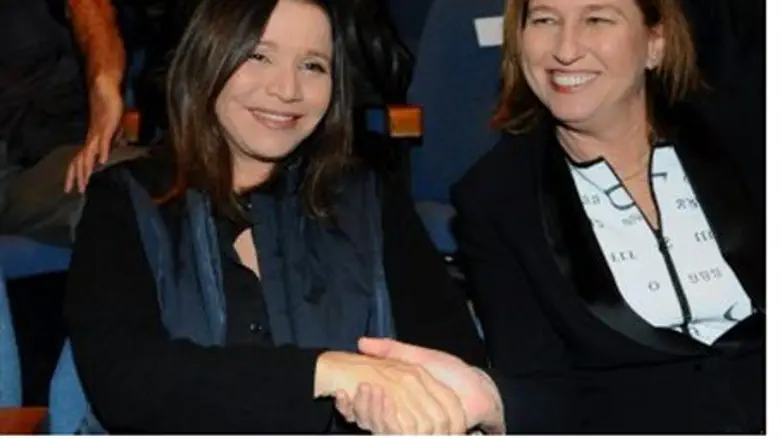
The Labor party (aka Zionist Union) has launched a predictable last-minute drive to rally a key constituency – “gender conscious” female voters, who base their vote on gender politics rather than on the parties' security, economic or general social policies.
In a 55-second advertisement targeting undecided female voters, MK Tzipi Livni, number two on the list, observes that Labor is the party with the most prominent female representation.
Former Labor head MK Shelly Yechimovich, who is number three, hints that it is important that women vote for the Zionist Union, “not just because we are women, but because you are women, and we are for women.”
"We fight for what is important to you,” states MK Merav Micheli, number nine on the list. And Stav Shafir, who is number four, explains that women should vote for the Zionist Union “if you, too, think that men don't have a monopoly on security, on the economy, on decision making in general.”
"The battle is close,” Livni adds, “and your vote will decide the outcome.”
Key factor in 2009, 2013 suprises
Political blogger Tal Schneider wrote recently that the Labor list of 2015 is arguably the most feminized list in Israel's history. It has three women in the top four and four women in the top ten, two of whom – Yechimovich and Michaeli – have been carrying the feminist flag for decades.
Michaeli, who is in the ninth spot, is considered to be a major force behind Yitzhak Herzog, who ousted Yechimovich from the party's leadership with her backing.
Although he is first on the Labor list, Herzog is not generally seen as a dominant figure.
When she headed Labor, Yechimovich also passed regulations mandating that at least 40% of the officials in the party's internal institutions must be female.
Schneider cites research that found that women made up most of the voters who were undecided until the last minute in previous elections. “This information helped Tzipi Livni, in 2009, draw a torrent of voters in her direction at the end of the campaign,” she explains, noting that Livni wound up with 28 MKs, one more than Likud, but failed to assemble a coalition.
In 2013, too, says Schneider, the last-minute undecided female voter population “was markedly drawn to Yair Lapid's very genderized list.”
Lapid's 2013 list had a very high proportion of women – as does Moshe Kahlon's current list – and Lapid himself is considered, arguably, to be the most visually attractive male party leader. His list achieved a last-minute surprise when it received a whopping 19 MKs, after polling at about 13 MKs.
"These assumptions, along with the accumulating data showing that women (not just in Israel, this is a global phenomenon) vote left more than right, assist the Labor party,” the blogger concludes.
The women's vote was also considered a key factor in the two elections that brought Barack Obama to the White House.
